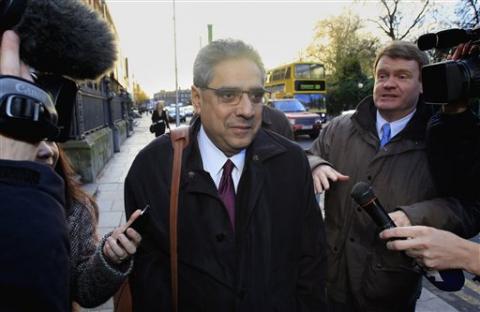Smashing Open the National Character Reserve Fund

"Time and again you have proved you can overcome adversity. And this time you do not face the challenges alone. Europe stands by you" – Olli Rehn, 9 November 2010.
Mr Ajai Chopra (pictured), IMF Mission Chief to Ireland, left the country the other day with a parting flourish. RTE's David Murphy asked him if Irish people ought to be fearful of the IMF. Chopra responded that the IMF's role is like that of a firefighter when a house is on fire or a doctor when a patient is sick. This is fortunate indeed, since the conditions of the IMF loan will mean cutbacks to both the fire service and the health service. When Murphy asked him – weirdly, as though he was auditioning for the Late Late Show – how he had found the Irish people, Chopra declared that the "pluck of the Irish" was coming out in the crisis.
Odd, no? If you go to the IMF site and browse its documentation, there's scant mention of how national character affects economic activity. There's nothing , for instance, like 'the Irish structural deficit is expected to decline to 8.5 percent of GDP in 2010 but this may rise to 8.75 percent if Ireland's pluck dissipates due to its people getting bogged down in naysaying'. Nor is there anything like 'regrettably, the effectiveness of internal devaluation measures, forcing down wages and forcing up unemployment, is threatened by a distinct lack of pluck on the part of workers'.
People might be used to hearing national politicians like Brian Cowen make umpteen declarations about how "we are a smart, resilient and proud people" but when even unelected technocrats (Chopra's own description is civil servant: answers on a postcard about which government he serves) like Mr Chopra, or Oli Rehn ("You are smart and stubborn people") cannot help but draw out key national characteristics, we might be wise to ask if something strange is happening.
To be sure, there is a lot of this national character-boosting about. As the chronicle of the EC-ECB-IMF bailout was foretold, the Irish Times ran a feature on Great Things about Ireland. The Evening Herald's editorial declared "We are a resilient people with a proven strength for working through dark clouds to find the silver lining." Not only that, but "as a nation we can overcome any obstacle eventually".
Perhaps the oddest instance of this sticking one's chest out and hoping for the best came from Minister Batt O'Keeffe, who likened negotiations between the Irish government and its 'partners' to a game of poker. The Irish government had taken on the mantle of The Gambler in the Kenny Rogers song: it was a matter of knowing when to hold 'em and when to fold 'em. When the government folded a week later, shovelling the contents of the National Pension Reserve Fund into the state's banking furnaces, it was The Coward of The County's 'twenty years of crawlin' that seemed more appropriate.
Where's all this 'Yes We Can – Because We're Great' positivity coming from? One possibility is from what has been described as "Scheherazade's strategy". Storytelling – Bewitching the Modern Mind by Christian Salmon, picks up on Karl Rove's use of the strategy in the mid-term elections of November 2006 in the United States, when George Bush's ratings were at an all-time low. Salmon writes, citing Ira Chernus, professor of Religious Studies at the University of Colorado that the principle behind Scheherazade's strategy is simple: "When policy dooms you, start telling stories-stories so fabulous, so gripping, so spell-binding that the king (or in this case, the American citizen who theoretically rules our country) forgets all about a lethal policy...The Scheherazade policy...plays on the insecurity of Americans who feel that their lives are out of control."
Should the Irish population fail to wrest control of its destiny from unelected technocrats and wealthy bondholders, the fabulous stories about how great we all are will only multiply.
